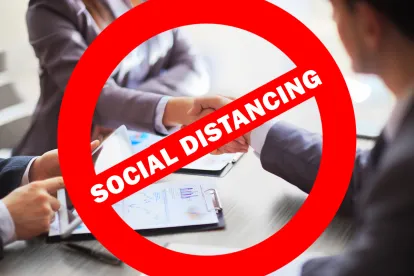The ongoing state of emergency related to the COVID-19 pandemic has severely impacted the ability of municipal governing bodies, planning boards, and zoning boards of adjustment to hold public hearings. Specifically, EO-103 (declaring a state of emergency) and EO-107 (heavily restricting public gatherings) have disrupted the conventional process for land use hearings contemplated by the Municipal Land Use Law, N.J.S.A. 40:55D-1, et seq. (“MLUL”) and the Open Public Meetings Act, N.J.S.A. 10:4-6, et seq. (“OPMA”). While the MLUL and OPMA remain controlling, it is both impractical and impossible for boards to hold in-person public meetings as they are accustomed to doing. To address this, the New Jersey Department of Community Affairs (“DCA”), Division of Local Government Services (“DLGS”) recently issued COVID-19-related Operational Guidance for municipal planning boards and zoning boards of adjustment for holding public meetings during the state of emergency. By complying with the recently-issued DLGS guidance, boards may hold “virtual” public meetings in lieu of “live” public meetings to ensure that critical business can still be conducted during the state of emergency.
DLGS’s Operational Guidance emphasizes the potential to use technology, where possible, to mitigate the impacts of COVID-19 and related governmental restrictions on the public hearing process. For example, whereas an interested member of the public seeking to review a land use application might ordinarily inspect it at the planning board secretary’s office, DLGS notes the potential to email application materials (or for the applicant to mail the materials individually) to any interested parties. Applicants are directed to update any notices of public hearing to reflect whatever location the application materials are available for inspection, including digital options such as a file sharing website or the municipal website. Boards are encouraged to conduct hearings via Zoom, Facebook, Youtube, or similar visual online platforms, with proceedings recorded as in the ordinary course. The DLGS memorandum sets forth specific prospective procedures for conducting meetings with such technology, including provisions for allowing public comment. Given the state of emergency declaration, boards are also permitted to file notices of public hearing electronically in full compliance with the OPMA. As a practical matter, boards are encouraged to limit agendas to administrative-type and other relatively uncontroversial matters, such as conforming minor site plan and subdivision applications.
The Operational Guidance is commendable and certainly appreciated by land use applicants desiring to press forward with development applications in the face of unprecedented challenges. Still, all applicants are urged to proceed with extreme caution. Public participation is a cornerstone of the New Jersey land use process. All parties involved are now attempting to integrate new (and, in some cases brand-new) technology into a land use process whose “old-fashioned” methods of ensuring robust public participation are, quite literally, tried-and-true. There are bound to be consequential stumbles as both applicants and boards look to technology as a means to clear the hurdles created by the COVID-19 pandemic.
Applicants proceeding with non-controversial applications (minor subdivisions, minor site plans, or “fully-conforming” applications) should feel confident that any board action taken after proper notice and in strict adherence with the Operational Guidance should not be at any significant additional risk of appeal as a result of the “virtual” hearing procedures. However, it is uncertain if complicated or controversial applications requiring variance or other more significant relief will be treated with the same deference by New Jersey’s courts should an appeal be filed, even where the Operational Guidance is followed. Being that this is an unprecedented situation, there will undoubtedly be factual scenarios for which no on-point legal precedent presently exists. Applicants that are concerned with the prospect of a potential appeal should consider carrying applications until such time as boards are able to reconvene in the traditional “live” setting (whenever that might be). In all events, applicants must proceed cautiously; including doing everything possible to provide adequate public notice with detailed instructions on how the interested public may participate in application proceedings and addressing any and all questions posed by the reviewing board and participating public.
Co-Authored by: Steven P. Gouin & Adam Garcia








 />i
/>i

